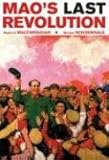Mao's last revolution /
Material type: TextPublication details: Cambridge, Mass. : Belknap Press of Harvard University Press, 2006Description: xiii, 693 pages : illustrations ; 24 cmContent type: text Media type: unmediated Carrier type: volumeISBN: 0674023323; 9780674023321; 9780674027480; 0674027485Subject(s): China -- Kulturrevolution | Culturele Revolutie | China -- History -- Cultural Revolution, 1966-1976 | Chine -- Histoire -- 1966-1969 (Révolution culturelle) | China | China | China -- KulturrevolutionGenre/Form: History.
TextPublication details: Cambridge, Mass. : Belknap Press of Harvard University Press, 2006Description: xiii, 693 pages : illustrations ; 24 cmContent type: text Media type: unmediated Carrier type: volumeISBN: 0674023323; 9780674023321; 9780674027480; 0674027485Subject(s): China -- Kulturrevolution | Culturele Revolutie | China -- History -- Cultural Revolution, 1966-1976 | Chine -- Histoire -- 1966-1969 (Révolution culturelle) | China | China | China -- KulturrevolutionGenre/Form: History. | Item type | Current library | Call number | Status | Date due | Barcode | Item holds |
|---|---|---|---|---|---|---|
 Books
Books
|
Main Library Non-Fiction - General Stacks | 951.056 .M143 2006 (Browse shelf (Opens below)) | Available | 32375 |
Browsing Main Library shelves, Shelving location: Non-Fiction - General Stacks Close shelf browser (Hides shelf browser)

|

|

|

|

|

|

|
||
| 951.04 .S674 1938 Red star over China / | 951.050 .C515 2010 A critical introduction to Mao / | 951.055 .D575 2010 Mao's great famine : the history of China's most devastating catastrophe, 1958-1962 / | 951.056 .M143 2006 Mao's last revolution / | 952.0088355 | 952.0088355 | 952.0088355 | 952.0088355 | 952.0088355 S769 2007 S769 2007 S769 2007 | 952.0088355 | 952.0088355 | 952.0088355 | 952.0088355 S769 2007 S769 2007 S769 2007 S769 2007 Samurai / | 952.010 .T944 2016 Samurai rising : the epic life of Minamoto Yoshitsune / | 952.033 .B624 2000 Hirohito and the making of modern Japan / |
Includes bibliographical references (pages 611-658) and index.
The first salvos -- The siege of Beijing -- Confusion on campuses -- The fifty days -- Mao's new successor -- The red guards -- Red terror -- Confusion nationwide -- Shanghai's "January Storm" -- Seizing power -- The last stand of the old guard -- The Wuhan incident -- The May 16 conspiracy -- The end of the red guards -- Cleanings the class ranks -- Dispatching Lie Shaoqi -- The congress of victors -- War scares -- The defection and death of Lin Biao -- Mao becalmed -- Zhou under pressure -- Deng Xiaoping takes over -- The gang of four emerges -- The Tiananmen incident of 1976 -- The last days of chairman Mao.
"The Cultural Revolution was a watershed event in the history of the People's Republic of China, the defining decade of half a century of communist rule. Before 1966, China was a typical communist state, with a command economy and a powerful party able to keep the population under control. But during the Cultural Revolution, in a move unprecedented in any communist country, Mao unleashed the Red Guards against the party. Tens of thousands of officials were humiliated, tortured, and even killed. Order had to be restored by the military, whose methods were often equally brutal." "Roderick MacFarquhar and Michael Schoenhals explain why Mao launched the Cultural Revolution, and show his Machiavellian role in masterminding it (which Chinese publications conceal). In often horrifying detail, they document the Hobbesian state that ensued. The movement veered out of control and terror paralyzed the country. Power struggles raged among Lin Biao, Zhou Enlai, Deng Xiaoping, and Jiang Qing - Mao's wife and leader of the Gang of Four - while Mao often played one against the other." "After Mao's death, in reaction to the killing and the chaos, Deng Xiaoping led China into a reform era in which capitalism flourishes and the party has lost its former authority. In its critical analysis of Chairman Mao and its portrait of a culture in turmoil, Mao's Last Revolution offers the most authoritative and compelling account to date of this seminal event in the history of China."--Jacket.

